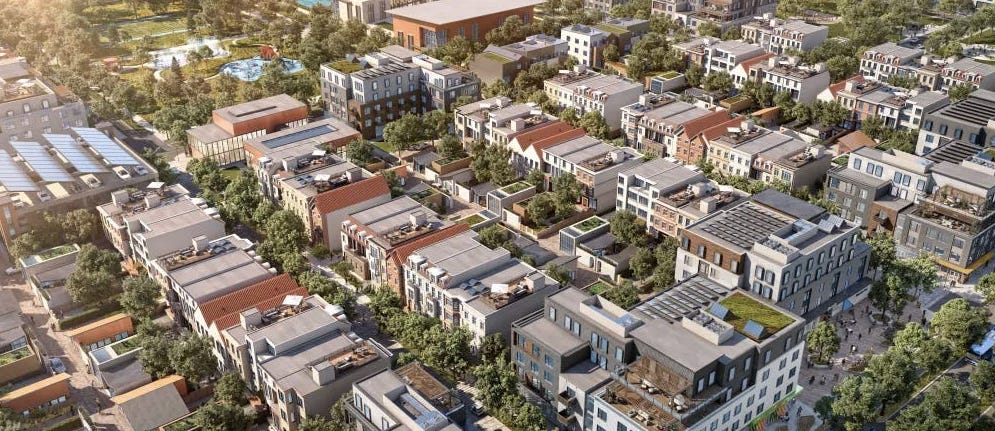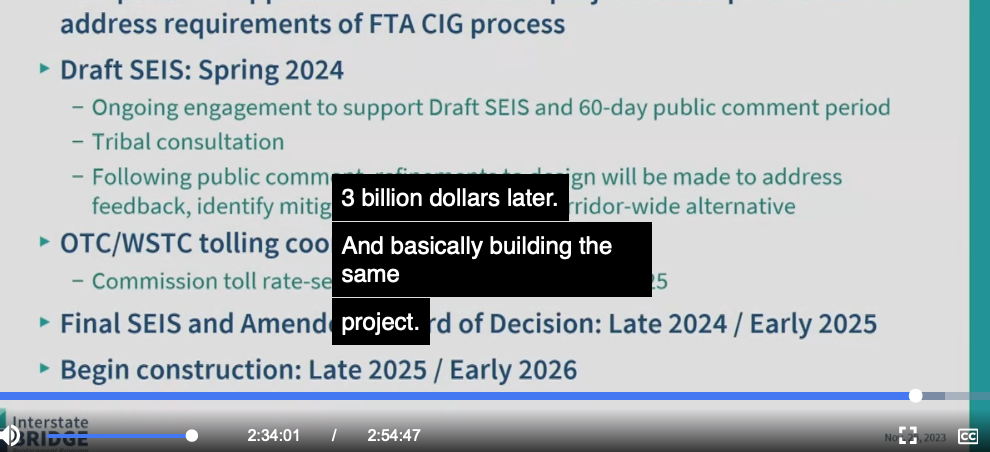What City Observatory this week
Why does it take four years and $200 million for consultants to serve up a warmed-over version of the Columbia River Crossing? The Interstate Bridge Replacement Project’s director admitted that he’s just pushing “basically the same” project that failed a decade ago, but in the process, he’s spent $192 million on consultants, with the largest single chunk of that money ($75 million) going to his former employer, WSP.
And WSP has returned the favor, providing Johnson with questionable reports that purport to rule out examining an immersed tunnel option and which exaggerate project benefits to qualify for federal funding. Between the failed CRC (which cost nearly $200 million a decade ago) and its rebranded clone, the IBR, the two states will have spent nearly $400 million, mostly on consultants, and without turning a shovel. More than 10 percent of IBR’s recent consulting largesse—more than $20 million—has gone to public relations firms to help it sell the project.
Must read
US DOT puts Fresno highway expansion on hold over environmental concerns. California had been planning to add new capacity and build new interchanges on Highway 99 in Fresno. Fresnoland reports that, under pressure from environmental groups, the Federal Highway Administration is reviewing this decision. CalTrans claimed that the project would have no significant environmental impact and would not increase air pollution, but local advocates—and now possibly, FHWA—disagree.
The project would serve a massive proposed freight distribution facility, and would increase truck trips and air pollution in an area that is not in compliance with state and federal air pollution laws. Left to their own devices, state highway departments have often played fast and loose with such environmental reviews; maybe FHWA will hold them accountable for obeying the law.
Seattle area puts road expansion ahead of climate goals. Writing at the Urbanist, Ryan Packer reports that when it comes to putting their money where their climate pledge is, Puget Sound leaders will just keep on widening highways, thank you. Two local government officials proposed prioritizing federal funds for safety and transit and active transportation projects, and ruling out using these flexible funds for highway expansion. As Packer relates:
. . . members of the Puget Sound Regional Council’s Transportation Policy Board, a group of local elected officials from Pierce, Kitsap, King, and Snohomish Counties tasked with regional planning issues, voted against a proposal to bar transportation projects that would add general purpose vehicle capacity to the region’s limited access highways from competing against other public transit and traffic safety projects for a specific pool of federal dollars, . . .
The unwillingness of regional leaders to take this relatively small step illustrates the degree to which a region that prides itself on being climate-forward is not ready to take the hard steps to actually make its emissions reduction goals a reality.
Sadly, it wasn’t even close: the proposal lost with 15 votes against and just 3 in favor.
California forever: Urban fantasy or exurban nightmare? There’s a brash, bold proposal for a huge urban-scale development in California, which proposes to build what amounts to a new city for 400,000 people in Northern California. Proponents are pursuing a ballot measure in Solano County to authorize the proposal, and their pushing plans for a dense, walkable gridded community that ticks many urbanist boxes. While it seems like an appealing way to address the Golden State’s chronic housing shortage, Benjamin Schneider raises some important qualms at Substack.

While a the local level the plan exhibits an admirable urban form, the new city’s location—and most critically— connections to the rest of the region, are sketchy and car-dependent. The city would be located between the San Francisco Bay Area and Sacramento. The city’s new residents would have plenty of non-car alternatives for local travel, but would need cars to travel pretty much anywhere else. The project anticipates widening local freeways, and in the process adding more traffic to the already congested Interstate 80. And, as Schneider reports, proponents have given little thought to connecting to regional rail, despite the fact that an Amtrak corridor runs nearby and a BART terminus is a bit further. It’s tempting to think that a new city in a greenfield can avoid the gnarly political problems that block redevelopment, but adding more population on the urban fringe exacerbates car dependence and increases pollution.
In the News
The Portland Mercury reported on our analysis of the rising cost of the Interstate Bridge Replacement boondoggle. The price tag rose from $4.8 billion to as much as $7.5 billion just a year ago and project staff are now letting on that the costs will go even higher.
Salem Breakfast on Bikes also pointed its readers to our analysis that the new price tag for the IBR is likely to reach $9 billion.

